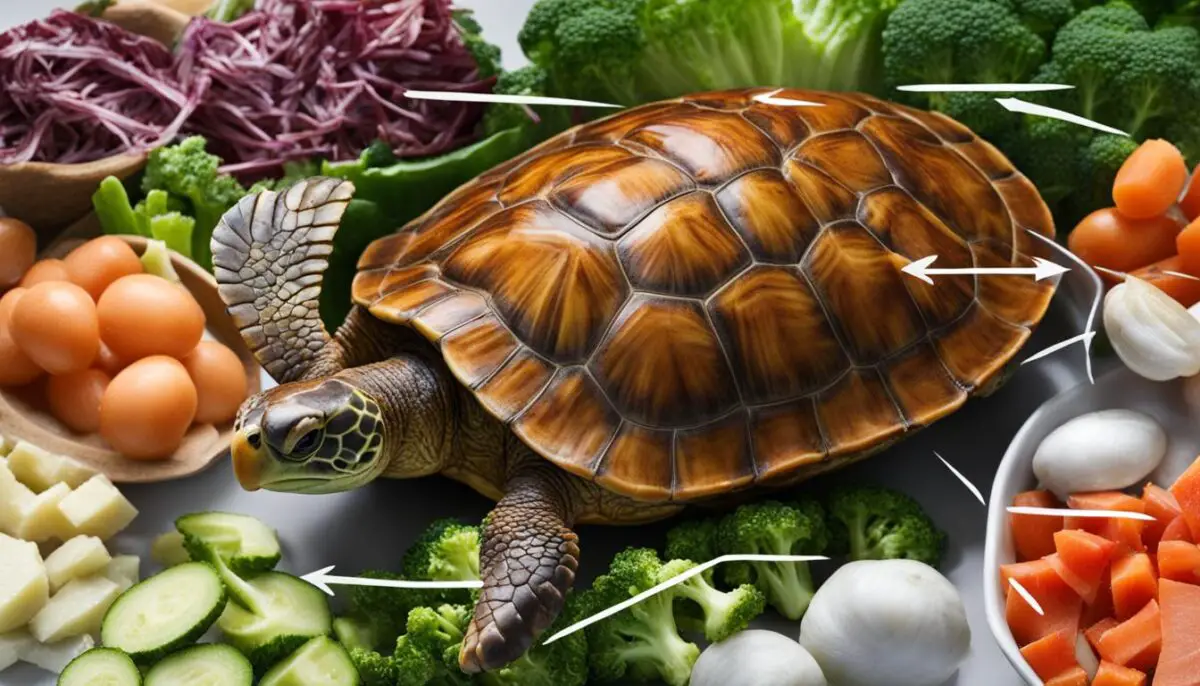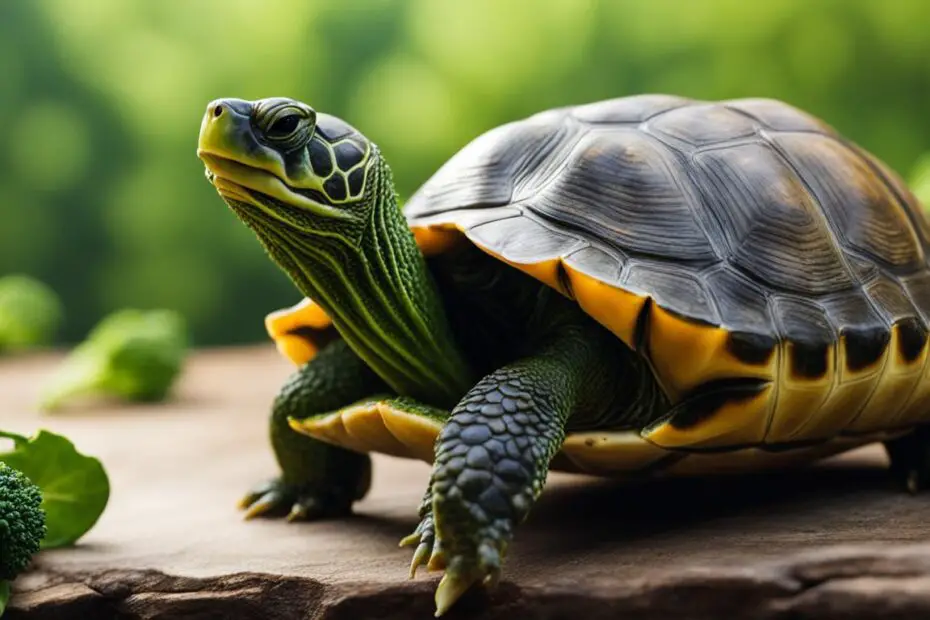When it comes to turtles and their diet, it’s natural to wonder if they can eat broccoli. Turtles, including popular pet turtles like the red-ear slider and box turtles, can safely enjoy broccoli as part of their plant-based meals. However, it’s important to understand the nutritional needs of turtles and the guidelines for feeding them before introducing broccoli into their diet.
Key Takeaways:
- Turtles can eat broccoli in moderation as part of their plant-based diet.
- Broccoli is not toxic for turtles and is considered a safe vegetable for them.
- Moderation is essential due to the presence of goitrogens and oxalates in broccoli.
- Turtles require a balance of calcium and phosphorus in their diet, and broccoli has a lower calcium content compared to phosphorus.
- Consulting with a veterinarian is recommended to ensure a balanced and healthy diet for your turtle.
Nutritional Benefits of Broccoli for Turtles
Broccoli is considered a superfood for humans due to its high nutritional value. It is rich in fiber, protein, vitamins, and minerals, making it a healthy addition to the diet of turtles as well.
Broccoli contains valuable vitamins, including vitamin C, which helps boost the turtle’s immune system, and vitamin K, which plays a crucial role in blood clotting and bone health. Additionally, broccoli provides significant amounts of vitamin A, essential for maintaining healthy skin, vision, and reproductive functions in turtles.
Furthermore, this green vegetable is packed with beneficial minerals such as calcium and phosphorus. Calcium is vital for proper bone and shell development in turtles, while phosphorus supports various physiological processes, including the formation of DNA and energy metabolism. The combination of these minerals in broccoli contributes to the overall well-being of turtles.
Including broccoli in their diet can provide turtles with much-needed fiber, aiding in digestion and preventing constipation. The presence of fiber also promotes satiety, helping to maintain a healthy weight for turtles.
| Nutrient | Amount per 100g of Broccoli |
|---|---|
| Protein | 2.8g |
| Fiber | 2.6g |
| Vitamin C | 89.2mg |
| Vitamin K | 101.6mcg |
| Vitamin A (RAE) | 31mcg |
| Calcium | 47mg |
| Phosphorus | 66mg |
While broccoli offers numerous nutritional benefits for turtles, it is important to feed it in moderation. Remember that a balanced diet, including a variety of vegetables, is crucial for a turtle’s overall health. Consult with a veterinarian to establish an appropriate diet plan that meets your turtle’s specific nutritional needs.

Healthy Diet Guidelines for Turtles
Turtles require a balanced diet that includes both plant-based and animal-based foods to meet their nutritional needs. Here are some guidelines to ensure your turtle’s diet is healthy and well-rounded:
1. Leafy Green Vegetables
Leafy greens like collard greens, kale, and turnip greens are excellent choices for turtles. They are packed with essential vitamins and minerals that support overall health. These vegetables should make up a significant portion of your turtle’s diet.
2. Safe Vegetables for Turtles
In addition to leafy greens, there are other safe vegetables that you can offer to your turtle. These include squash, green beans, carrots, peas, bell peppers, and dandelions. These vegetables provide additional nutrients and variety to your turtle’s diet.
3. Limited Fruit Intake
While fruits can be a tasty treat for turtles, they should be offered sparingly. Fruits are generally less nutritious than vegetables and can be high in sugar. Too much fruit consumption can lead to obesity and other health issues in turtles.
4. Animal-Based Protein Sources
Turtles also require animal-based protein sources in their diet for optimal health. Insects such as crickets and mealworms are a great option. You can also include commercial reptile pellets that are specifically formulated for turtles. However, be cautious about the frequency and portion sizes of these protein sources.
5. Consult a Veterinarian
It is always recommended to consult with a veterinarian who specializes in reptiles to determine the specific dietary needs of your turtle species. They can provide expert guidance on the appropriate diet for your turtle and ensure they are receiving all the necessary nutrients.
By following these healthy diet guidelines, you can provide your turtle with a nutritionally balanced diet that supports their overall well-being.
| Plant-Based Foods | Animal-Based Protein Sources |
|---|---|
| Leafy greens (collard greens, kale, turnip greens) | Insects (crickets, mealworms) |
| Squash | Commercial reptile pellets |
| Green beans | |
| Carrots | |
| Peas | |
| Bell peppers | |
| Dandelions |
Conclusion
In conclusion, it is safe for turtles to eat broccoli, but it should be included as part of a balanced diet and offered in moderation. While broccoli is not toxic for turtles, it contains goitrogens and oxalates that can adversely affect their health if consumed in excessive amounts.
Turtles require a specific calcium to phosphorus ratio for optimal bone and shell health. Broccoli has a lower calcium content compared to phosphorus, so it should not be the main staple food for turtles. Instead, it is important to focus on providing a variety of other vegetables and leafy greens that can fulfill their nutritional needs.
To ensure your turtle’s diet is safe and healthy, it is recommended to consult with a veterinarian who specializes in reptiles. They can provide valuable guidance and tailor a diet plan that meets your turtle’s specific nutritional requirements. By following proper feeding guidelines and offering a well-balanced diet, you can promote the well-being and longevity of your turtle companion.
FAQ
Can turtles eat broccoli?
Yes, turtles can eat broccoli in moderation as part of their plant-based diet.
Is broccoli toxic for turtles?
No, broccoli is not toxic for turtles. It is considered a safe vegetable for box turtles and aquatic turtles.
Why should broccoli be fed in moderation?
Broccoli should be fed in moderation because it contains goitrogens and oxalates that can have negative effects on turtle health if consumed in excess.
What are goitrogens and oxalates?
Goitrogens are substances that can interfere with the normal function of the turtle’s thyroid gland, while oxalates can bind to calcium and hinder its absorption in the turtle’s body.
What is the calcium to phosphorus ratio for turtles?
Turtles require a specific balance of calcium and phosphorus in their diet for healthy bone and shell development. The calcium content in broccoli is lower than the phosphorus content, which can disrupt this ratio if fed in excess.
What are the nutritional benefits of broccoli for turtles?
Broccoli is rich in fiber, protein, vitamins (such as vitamin C, vitamin K, and vitamin A), and minerals (such as calcium and phosphorus). These nutrients can contribute to the overall health of turtles.
What other vegetables are safe for turtles?
Other safe vegetables for turtles include collard greens, kale, turnip greens, squash, green beans, carrots, peas, bell peppers, and dandelions.
What should be included in a healthy diet for turtles?
To provide a healthy diet for turtles, it’s important to offer a balanced mix of plant-based and animal-based foods. Leafy green vegetables, like collard greens and kale, should make up a significant portion of their diet. Animal-based protein sources, such as insects and commercial reptile pellets, can also be included in moderation.
Do fruits play a role in a turtle’s diet?
Fruits should be offered sparingly, as they are less nutritious than vegetables. They can be included as occasional treats.
What are the guidelines for a balanced diet for turtles?
It is recommended to consult with a veterinarian to determine the appropriate diet for your specific turtle species and their nutritional needs. They can provide detailed guidelines based on your turtle’s age, size, and species.

